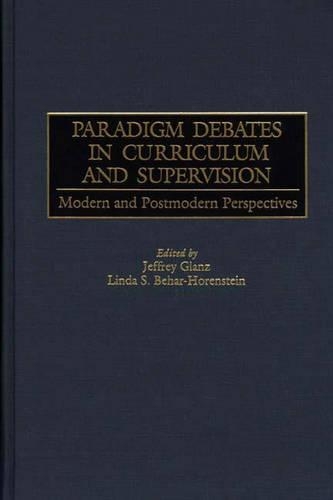
Paradigm Debates in Curriculum and Supervision: Modern and Postmodern Perspectives
(Hardback)
Publishing Details
Paradigm Debates in Curriculum and Supervision: Modern and Postmodern Perspectives
By (Author) Linda Behar-Horenstein
By (author) Jeffrey Glanz
Bloomsbury Publishing PLC
Praeger Publishers Inc
30th January 2000
United States
Classifications
Tertiary Education
Non Fiction
Schools and pre-schools
371.2
Physical Properties
Hardback
312
Description
Paradigm debates in the educational research community are a frequent if not common occurrence. How do paradigm debates in other educational fields, such as curriculum and supervision, shape educators' understanding and practice In this volume, it is suggested that educators' adherence to particular views of curriculum and supervision is influential in guiding their beliefs and subsequent actions. For example, a widely accepted belief is that if an individual adopts a mechanistic view of the curriculum, then s/he is likely to deliver a curriculum grounded in pre-established objectives and evaluate student achievement in relationship to formulated objectives. Postmodernists contend that such educators are bound by rigid bifurcation and a constrictive linear logic. In supervision, educational leaders who favor leadership styles comprised by autocratic behaviors, tend to create school climates that favor a top-down approach to human relationships. Autocratic leaders rely on hierarchical organizational structures and styles that seek to instill compliance and subordinance. Yet prospective administrators who want concrete proposals put in practice find modern perspectives of supervision helpful. In contrast, postmodern supervisors allege that such leaders disallow the emergence of relevant and authentic relationships that might occur when conventional hierarchical structures are diminished and open lines of communication between teachers, students, administrators become normative. The chapters in this book present an in-depth analysis of how an individual's predisposition towards modern and postmodern views of curriculum and supervision are likely to influence: (1) curriculum development, (2) teaching styles, (3) leadership styles, (4) teacher and student evaluation, and (5) the missions intrinsic to the creation of professional preparation programs that serve to promulgate existing practice or create a new order of teachers and administrator.
Reviews
Thoughtfully balancing theoretical and practical perspectives, the chapters provide an in-depth analysis of the influence of this debate on educators' perceptions of curriculum development, leadership, teaching, school evaluation, and administrative and teacher preparation programs. The editors have fashioned a usable volume with sections on modern and postmodern conceptions of curriculum and supervision and practicioners' responses regarding the suitability and application of modern and postmodern concepts on school practice.... The book could serve education faculty seeking to clarify their views regarding the impact of modernist and postmodernist thought on program development as well as hold the interest of graduate students in education.-Choice
"Thoughtfully balancing theoretical and practical perspectives, the chapters provide an in-depth analysis of the influence of this debate on educators' perceptions of curriculum development, leadership, teaching, school evaluation, and administrative and teacher preparation programs. The editors have fashioned a usable volume with sections on modern and postmodern conceptions of curriculum and supervision and practicioners' responses regarding the suitability and application of modern and postmodern concepts on school practice.... The book could serve education faculty seeking to clarify their views regarding the impact of modernist and postmodernist thought on program development as well as hold the interest of graduate students in education."-Choice
Author Bio
JEFFREY GLANZ is Associate Professor in the Dept. of Instruction, Curriculum, and Administration at Kean University, NJ./e LINDA S. BEHAR-HORENSTEIN is Associate Professor in the Dept. of Educational Leadership at the University of Florida, Gainesville./e
